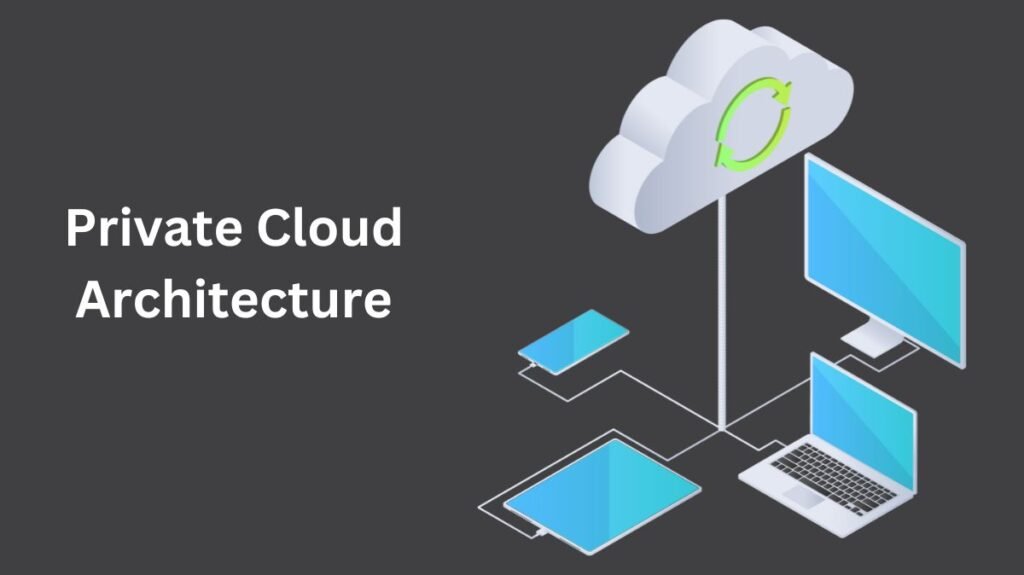What Is Private Cloud? Architecture, Private Cloud Vendors
Contents
What Is Private Cloud?

A private cloud is a deployment paradigm for cloud computing in which a single client or user organisation has exclusive access to all cloud services. Scalability, flexibility, and quicker service delivery are just a few of the advantages that private clouds, also known as internal private clouds or corporate clouds, provide over cloud computing platforms. However, because private clouds are single-tenant, users may keep the same degree of security, control over access, and personalization that they had with on-premises systems.
Although private clouds were formerly operated on-site, it is now feasible to use rented infrastructure in the data centres of cloud service providers to offer private cloud services.
How Does Private Cloud Works?
The management of the workloads is more important when considering a private cloud than the location of the workloads. With in and across dispersed it deployment sites, a private cloud offers a consistent cloud operating model and user experience.
A consistent private cloud platform with flexible deployment options to support business requirements around performance, cost, agility, sovereignty, compliance, scale, and regulatory requirements is implemented everywhere the organisation conducts business to attain this “best of all worlds” condition.
Private Cloud Architecture

With the exception of single-tenant architecture, it is built on the same technologies as other cloud computing platforms, allowing the user to provision and configure virtual servers and computing resources as needed. This allows the system to scale quickly and easily (or even automatically) in response to user and traffic spikes, implement redundancy for high availability, and optimize resource utilization overall.
Among these technologies are the following:
Virtualization
Through, IT resources can be separated from their underlying physical hardware and combined into limitless pools of memory, storage, processing power, and networking capacity. These resources can then be divided among several virtual machines, containers, or other components of the virtualized IT infrastructure. Virtualization makes it possible to maximize system utilization, distribute hardware effectively across several users and applications, and enable the cloud’s scalability, agility, and flexibility by eliminating the limitations of physical hardware.
Management Software
Administrators have centralized control over the infrastructure and programs that operate on it to management software. This enables the private cloud environment’s security, availability, and resource utilization to be optimized.
Automation speeds
Automation expedites processes that would normally need manual labour and repetition, including server provisioning and integrations. Self-service resource distribution is made feasible by automation, which lessens the need for human interaction.
In order to increase efficiency and flexibility and facilitate a seamless transfer to a public cloud or hybrid cloud environment later on, private cloud users should also embrace cloud native application designs and methods like DevOps, containers, and microservices.
Private Cloud Computing Companies
Let’s take a quick look at some of the top private cloud providers’ offerings.
HPE
One pioneer in the private cloud computing space is Hewlett Packard Enterprise (HPE).For several years, it opens a new window market. The private cloud service provider provides infrastructure and software that may be customized. When combined with a public cloud, the HPE private cloud offers a quicker connection while maintaining the same level of security. Services, hardware, and software are all part of HPE’s private cloud solutions. Among its private cloud solutions are Managed Virtual Private Cloud services, Helion Managed Private Cloud, Helion Cloud Suite software, and Helion Cloud System hardware.
VMware
VMware provides private cloud solutions in two varieties. One solution is fully private, while the other is a hybrid that provides automated lifecycle management and an integrated stack. VMware provides a wide range of services, but its virtualization software, which powers many private cloud environments, is its most well-known offering. Both private and hybrid cloud administration are available with VMware’s vRealize Suite Cloud administration Platform. In contrast, the VMWare Cloud Foundation is a private cloud data centre platform.
Dell
Two private cloud options are available from Dell EMC. One is a readymade developer platform, while the other is designed for Microsoft Azure Stack. Long-time private cloud leader Dell gained power by merging with EMC. Virtual private cloud services, cloud management and security software, and cloud consulting services are the company’s cloud products.
Oracle
A scalable data centre that can handle a variety of workloads is Oracle’s Private Cloud Appliance. The company’s cloud platform, infrastructure, apps, lifecycle management tools, integration services, and managed cloud services are all included in its private cloud solutions.
IBM
Open source frameworks like Kubernetes and Cloud Foundry served as the foundation for the IBM private cloud’s architecture. IBM offers private cloud products include Cloud Manager, Cloud Orchestrator, IBM Cloud Managed Services, and IBM Systems and Storage. Microsoft, Cisco, NetApp, Red Hat, and AWS are additional major private cloud providers.
Difficulties Of Private Cloud
Certainly, private clouds are secure. However, internal cloud management is difficult. Private clouds provide various issues for organizations:
- Private clouds cost more than public and hybrid clouds because they require server hardware and upkeep. Buying operating systems and software licenses raises costs.
- More help needed: Private clouds are more expensive and time-consuming to set up than hybrid or public clouds. Also need ongoing maintenance. Private cloud services require in-house IT. Your internal IT department will need additional time and resources to remedy a server crash.
- Private clouds are less scalable than public clouds. Using a private cloud, an organisation may not be able to accommodate increased demands.
They must size and setup an environment to accommodate expected demands. Configuring an environment without over- or under-provisioning capacity is difficult and unpredictable. You must secure the networking environment, mitigate vulnerabilities and harmful attacks, and enforce smart, appropriate end-user behavior for the corporate mandate. While overwhelming, it may be beautiful when done well.
Companies investing in a private cloud must monitor, analyze, and troubleshoot the infrastructure to prevent security breaches and capacity mismatches from causing costly downtime. Visibility and management of virtualized environments that operate and affect infrastructure capacity assist identify concerns.